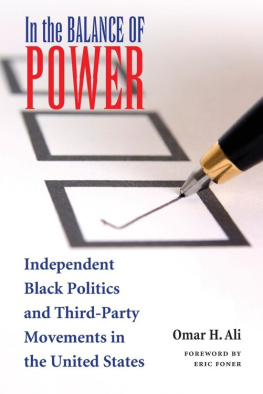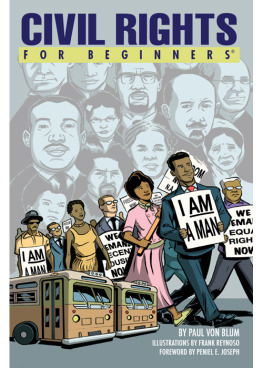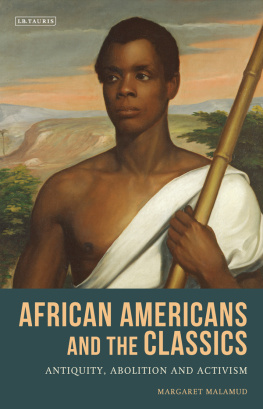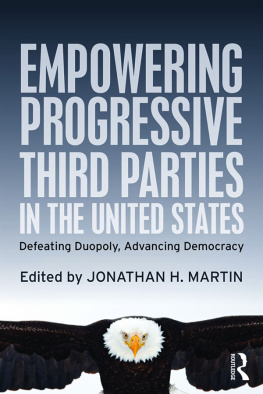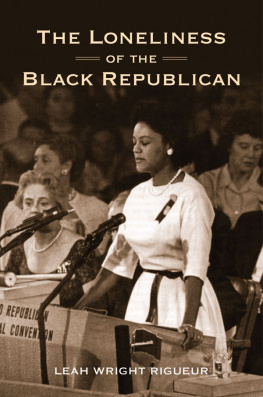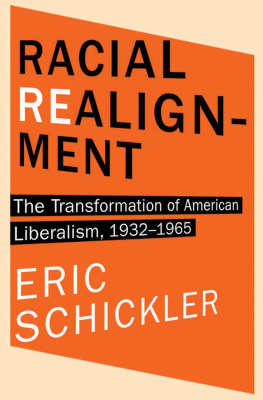In the Balance of Power

Ohio University Press, Athens, Ohio 45701
www.ohioswallow.com
2008 by Ohio University Press
All rights reserved
To obtain permission to quote, reprint, or otherwise reproduce or distribute material from Ohio University Press publications, please contact our rights and permissions department at (740) 593-1154 or (740) 593-4536 (fax).
Printed in the United States of America
Ohio University Press books are printed on acid-free paper 
15 14 13 12 11 10 09 08 5 4 3 2 1
Library of Congress Cataloging-in-Publication Data
Ali, Omar H. (Omar Hamid)
In the balance of power : independent Black politics and third-party movements in the United States / Omar H. Ali ; foreword by Eric Foner.
p. cm.
Includes bibliographical references and index.
ISBN 978-0-8214-1806-2 (hc : alk. paper) ISBN 978-0-8214-1807-9 (pb : alk. paper)
1. African AmericansPolitics and government. 2. Third parties (United States politics)History. 3. United StatesRace relationsPolitical aspectsHistory. I. Title.
E185.18.A45 2008
323.1196073dc22
2008027326
Para Diana, Pablo, y Samina
Contents
Foreword
Although Americans habitually refer to our political structure as a two-party system, third parties and other independent political movements have been a persistent feature of our history. From the Workingmens parties of the late 1820s to the recent presidential candidacies of John Anderson (1980), Ross Perot (1992), and Ralph Nader (2000 and 2004), some Americans have always felt that the two major parties fail to reflect their interests and concerns. Third parties have forced into the public sphere issues that their larger counterparts sought to avoid, such as slavery before the Civil War and the plight of farmers in the era of Populism. Although only one third party, the Republican Party, in the 1850s, has actually risen to national power, many have influenced the course of American history by giving voice to otherwise silenced discontents.
Indeed, many ideas widely taken for granted and assumed to be timeless features of American culture originated with independent political movements, whether organized as political parties or taking other forms. The idea of freedom as a universal entitlement, for example, was developed by the abolitionists, who developed the idea of equal citizenship irrespective of race. The modern idea of privacythe extension of individual rights into the most intimate areas of personal lifearose from the efforts of generations of feminists to secure for women control over their own persons. Without political mobilizations outside the two-party system, it is difficult to imagine the progress that has been made in the last half-century toward the goal of equal rights and opportunities for all Americans, regardless of race. Independent political movements have made this a better society.
For black Americans, the traditional two-party system has posed a particular set of challenges. Before the Civil War, the vast majority of African Americans, of course, were slaves, stripped of all legal and political rights. Even those who were free generally lacked the right to vote, so political action, almost by definition, had to take place outside the confines of the major parties. After the nations brief experiment with interracial democracy during the era of Reconstruction that followed the Civil War, the Democratic and Republican parties ignored the plight of black Americans. Nonetheless, where they were able to vote, blacks generally supported the Republican party, which had freed the slaves. During the 1930s, black voting allegiance began to shift to the Democrats, a trend that culminated in recent elections, when under 10 percent of the black electorate supported the Republican candidate for president. But many black political leaders today feel that their votes are taken for granted by a party that lacks a substantive program for addressing the continuing incidence of racial inequality in American life.
It is not surprising, given this history, that some black leaders have seen political independence as offering the most viable strategy for their community. In the pages that follow, Omar Ali traces the history of black participation in third parties and in other forms of political activism. His narrative touches on subjects that have inspired an extensive historical literature, such as abolitionism and the Black Panther party, and on lesser-known parts of this history, including black participation in the Socialist, Progressive, and Communist parties. He reveals the complex dynamics that have shaped the sometimes problematic relationships between African Americans and third-party movements.
As perhaps the most systematically oppressed group in the United States, blacks might be thought to welcome movements for far-reaching social change, and, indeed, they have often responded with enthusiasm to such movements. But at the same time, very few white-dominated independent political organizations have ever achieved a real harmony between blacks and whites. To some extent, of course, radicals and reformers cannot escape the societies they hope to transform, and the problem may be seen as simply one more example of the tensions inherent in American race relations, or of the pervasiveness of racism, even within third-party movements themselves.
Politically, African American leaders have found it difficult to decide where to look for allies in the larger society, or whether to eschew white allies altogether in favor of separatism. Conceptually, they have never reached a consensus on how to define the status of black Americans, a question with profound implications for finding the right strategy for political change. Are blacks members of an ethnic group, analogous to Polish Americans, Italian Americans, and other immigrant minorities, in which case they should operate as a political pressure group that seeks to elect more of their members to office and obtain a larger slice of the political pie? Are they members of an internal colony, whose situation is similar to colonized peoples in the Third World, in which case self-determination or even racial separation suggests itself, rather than seeking greater power within the existing system? Or are they basically downtrodden members of the working class, who ought to form alliances with other workers based on common class interests?
If these questions have proven intractable, it is also true that many white-dominated independent political movements have not effectively addressed the unique plight of African Americans as slaves, descendants of slaves, and victims of forms of oppression not experienced by other Americans. What kind of relationship could blacks forge with political movements such as the Populists, for example, who exalted the idea of the autonomous property-owning citizen? Or with movements based on the ideal of the free individual standing against state and society? Or with unionism, socialism, and communism, which saw social class as the fundamental dividing line in American society? None of these ideologies seemed entirely relevant to the black experience. Blacks were not propertied individualsmost of them were property before the Civil War. The idea of the free individual did help to inspire the crusade against slavery, in which many blacks took part, but it proved unable to solve the social and economic plight of the freed people after emancipation. Movements based on social class, finally, have faced a dual problem in attracting black support. On the one hand, there was the simple fact of racism in many unions. Perhaps more importantly, even those class movements that made genuine efforts to enlist black support generally subordinated racial issues to ones of class exploitation, defining the status of blacks as part of the larger plight of the proletariat or small farmer. The specific historical experience of blacks as a portion of the working class operating in a severely segmented labor market, subject to lynching, segregation, and disenfranchisement, was rarely addressed systematically by such movements. Moreover, their rallying cry, solidarity of all workers, black and white, flew in the face of the everyday experience of black Americans.
Next page
